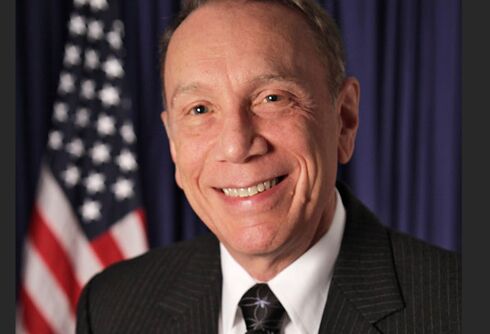Throughout the late 80s, 90s, and early 2000s, Americans became obsessed with anabolic steroid doping – i.e., hormonally altering one’s body to win sports competitions. In 1988, Canadian Olympic sprinter Ben Johnson lost his gold medal from the Seoul Olympics due to doping with anabolic steroids. This led to international outcry, and after a series of hearings in the U.S., the Anabolic Steroids Control Act of 1990 was passed as part of the Crime Control Act.
Twenty-seven steroids, including testosterone, were classified as Schedule III drugs and subject to imprisonment and fines for possession and distribution. Then-senator Joe Biden was invested in this issue, saying at the time, “I think you are going to see, over the next several years, some real backlash from the public about sports in America… There is a feeling of resentment that is growing, and I do not know how it will manifest itself.”
Related:
New series depicts a dark moment in queer history & shows how oppressors manipulate the oppressed
Alongside the love story in “Fellow Travelers” lurks a more insidious tragedy.
Unfortunately, moral panic over steroids has always had the criminalization of transmasculine people as collateral damage. Prior to 1990, FTM Newsletter was known to suggest getting around pricey American testosterone by trafficking it across the border. One September 1989 ad read, “Vacationing in Mexico? One of our members asked us to inform any FTM’s visiting Tijuana, Mexico, that he was able to purchase Depo-Testosterone in a 10 ml vial over the counter for $18.”
Never Miss a Beat
Subscribe to our newsletter to stay ahead of the latest LGBTQ+ political news and insights.
In contrast, the September 1990 issue of FTM Newsletter informed its readers that they would have to ask their doctors to lie on their prescriptions if they wanted to have a stockpile of extra testosterone in their home – a useful thing to have in the case of shortages or rejections from transphobic pharmacists. These rejections are all too common because many states require people to show their photo identification (potentially revealing one’s dead name and legal sex) and log their prescription in prescription drug monitoring programs (often under one’s dead name) for them to be able to access testosterone.
The criminalization of simple possession and the risk of being accused of encouraging drug trafficking across borders has chilled discussion of trying to get hormones abroad or on the gray market. Do-it-yourself transition communities today, which allow discussions of gray market estrogen, ban discussions of how one might acquire testosterone. The fear of prosecution is not unfounded; transmasculine folks have reported being arrested for possession of testosterone they acquired legally. If law enforcement were to decide that a transmasculine person was possessing testosterone illegally, their first offense could land them up to a year in prison and a $1000 fine.
One would hope that the passage of the Anabolic Steroids Control Act of 1990 would satisfy politicians and a populace obsessed with steroids, but one would be wrong. Between 1998 and 2006, American politicians and NGOs purposefully engineered a second anabolic steroid moral panic. The anti-steroid propaganda many millennials probably experienced as children has roots in a Salt Lake City, Utah Olympic bribery scandal and the way cisgender men in power tried to save face in the aftermath.
The Winter Olympic bid scandal
In 1998, it was revealed that the president and vice president of the Salt Lake City bid committee had allegedly paid a total of over $1 million in cash and gifts to bribe over a dozen International Olympics Committee (IOC) officials in the hopes that their city could host the 2002 Winter Olympics. The president and vice president (who were indicted in 2002 but acquitted in 2003) allegedly also pocketed $130,000 in bribes from the hospitality company Jet Set Sports. Three other Americans were indicted for fraud, and one became a fugitive of the law. Shortly after, the news broke that similar bribery and fraud may have taken place when bidding for the Atlanta, Georgia; Nagano, Japan; and Sydney, Australia games.
It came as no surprise to journalists at the time that the IOC would wish to rebrand itself as an upstanding organization leading the charge against corruption in sports. The IOC looked to the United States for suggestions on how to clean up its image. The Office of National Drug Control Policy (ONDCP) recommended that it create an Olympic anti-drug agency and stated that the US was open to committing $1 million for research into new anti-drug tests.
In February 1999, the IOC unveiled the World Anti-Doping Agency (WADA), which sought to curb the use of performance-enhancing drugs. WADA received $25 million from the IOC to level up its bureaucracy, with hopes that this would eventually be subsidized by governments – though, as Scientific American noted at the time, WADA was “unwilling to put its full support behind experimental tests that might not withstand legal challenge in the Court of Arbitration.”
In 2000, President Bill Clinton created the White House Task Force on Drug Use in Sports, emphasizing that it came from concern for “the health and safety of America’s athletes, in particular our Nation’s young people” and “the integrity of honest athletic competition.” He cited the 1999 Monitoring the Future Study and claimed that it found that “steroid use among young people rose roughly 50 percent among both sexes and across all age groups.” This was a lie. For all young people, the number jumped from 1.4% to 1.9% between 1998 and 1999. But it sounded true enough to give the task force legitimacy.
Shortly after, the US Olympic Committee launched the US Anti-Doping Agency (USADA). USADA launched playclean.org as a hub for propaganda and began producing anti-doping commercials, print ads, and handbooks for coaches that conflated anabolic steroid use with the use of addictive drugs. In 2000, the White House Task Force on Drug Use in Sports met for the first time in Salt Lake City, accompanied by Mitt Romney (then-President of the Salt Lake City organizing committee), Mike Leavitt (then-Governor of Utah), and many other government and NGO representatives and athletes.
Experts who attended the meeting expressed the desire to push the federal government to close loopholes on steroid precursors and prosecute steroid possession and sale more harshly. Both the White House Task Force on Drug Use in Sports and the USADA fixated on how youth might admire athletes who use anabolic steroids and how they might access steroids on the internet.
As usual, this stigmatization came at a cost for transmasculine people. In the Fall 2002 issue of FTM Newsletter, trans man Marcus de María Arana wrote an article called The High Price of Manhood in which he described medical neglect at the UCSF ER that caused him to experience septic shock and lose 25% of his femur after a botched testosterone injection. According to Arana, “[T]he prevailing attitude was that I brought this upon myself by messing around with steroids… I got the vibe from some providers that I had gotten what I deserved for messing with nature.”
The aftermath
In 2004, Utah Republican congressman Orin Hatch and then-Senator Joe Biden cosponsored the Anabolic Steroid Control Act of 2004, which was framed as a way to stop health food stores from selling shady products, to demand an investigation into whether stronger sentencing was necessary, and to award grants to organizations that would distribute anti-steroid propaganda. Considering that Hatch was the architect of a 1994 law that allows supplement companies to avoid federal regulation (which has resulted in deaths), it’s tough to believe that Hatch was more invested in consumer safety than the reputation of the state of Utah. Biden expressed nationalistic concerns at a hearing in March 2004, saying, “There’s something simply un-American about this. This is about values, about culture, it’s about who we define ourselves to be.”
Congress then called on anti-steroid activist Dan Hooton, whose son died by suicide after steroid cessation, to speak about how youth might be accessing steroids on the internet.
According to Hooton, “When I put three words into the Google search engine: ‘buy, steroids, online,’ over three hundred thousand sites popped up. Senators, all our kids need are a credit card number or a money order to have hardcore prescription anabolic steroids shipped right to their doorstep.”
Joe Biden claimed that half of all children believed that their favorite sports stars used steroids and called it “a devastating idea.” The Anabolic Steroid Control Act of 2004 was passed, and by 2006, sentencing guidelines for steroid possession and distribution became much more severe.
Meanwhile, Joe Biden’s political stock has risen, thanks largely to his reputation as a bipartisan negotiator of bills like the Anabolic Steroids Control Act of 2004.
Biden is sitting President of the United States at a time in which transmaculine folks’ increased visibility has prompted fearmongering books such as Abigail Shrier’s Irreversible Damage: The Transgender Craze Seducing our Daughters and legislation restricting transition of all kinds. Transmasculine folks are now in the curious position of hoping that recent calls from Senators Ed Markey (D-MA) and Elizabeth Warren (D-MA) to deschedule testosterone will not be ignored by the very man who put those laws in place.
While Biden has made statements nominally supporting transgender folks, they have not extended to removing one of the biggest legal hurdles to transmasculine folks living lives free of fear and harassment, nor have they even acknowledged his own culpability in the situation.
For now, and seemingly for the first time, Biden has chosen to have no opinion on testosterone.
*Editor’s Note: This article originally stated Ben Johnson was an American runner. It has been updated to reflect he ran for Canada.
















